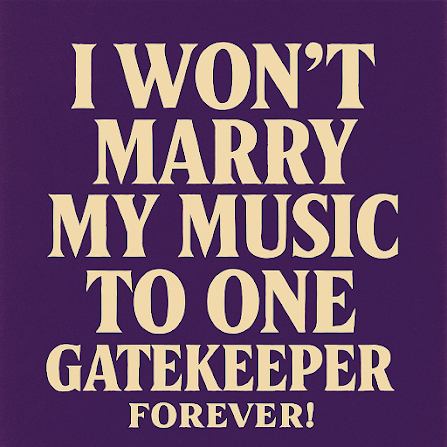Why I’ll Never Marry My Music to One Gatekeeper!

Exclusive orNon-Exclusive?
If you’re an indie artist navigating the sync licensing world, this is the question.
Amonth ago, I was still debating it. Now, my answer is crystal clear: Non-exclusive only. And if you’re seriousabout protecting your music, I’m going to tell you why.
Howa Corrupt Distributor Woke Me UpLastyear, my former distributor — the Swedish company AMUSE — accused me of usingAI playlists. Without warning, they locked my account.
Ihad no access to my music for an entire month.
No explanation. No respect.
Ihad to start an online petition and publish open letters to their CEO to get myown copyrighted work back.
It was one of the most stressful experiences of my career. And yet,looking back now, I’m gratefulfor it.
The Harsh Truth About Streaming PlatformsThat incident made me realize I was playing a rigged game:
· Artists promote their music for free.
· Corporations get richer.
· We get paid pennies.
Let’s talk numbers: 1 millionstreams = roughly $3,000.
When Spotify claimed my music had landed on an AI playlist (without myknowledge), I had only a few hundred streams — yet they treated me like acriminal.
If that’s how they act over a few hundred plays, imagine what they’d doif you actually hit a million.
This is modern-day artisticslavery: hopeful indie artists doing free labor for billion-dollarcompanies.
From Streaming to Sync Licensing: Same Game, Different RulesAfter walking away from streaming, I dove into sync licensing.
It didn’t take long to see the same patterns:
· Exploitativecontracts thatgive away your rights forever.
· No upfrontpayment, justvague promises.
· Zero guarantee your music will even get placed.
Some “exclusive” deals are basically a black hole for your songs.
Why I Choose Non-Exclusive LicensingRecently, I had the chance to sign my album with three exclusivelibraries in the USA, Switzerland, and Italy.
After emails and video meetings, one thing became obvious:
Signing away my music forever withoutupfront payment would be insanity.
As a lyricist and vocalist, my songs are my identity. I’m not handingthem over to one company, especially if they:
· Don’t give me credit in their catalog.
· Control how and where my music is used.
· Keep the majority of the profit.
My Reasons for Staying Non-Exclusive· Legacy4Humanityis message-driven. These are more than songs — they’re stories.
· I want creativecontrol.Always.
· Freedom overrestriction.My music won’t belong to one gatekeeper forever.
· Flexibility. I can release remixes, reworks, andnew versions whenever I choose.
· Directconnections. Ican pitch to music supervisors who resonate with my work.
· Multipleopportunities.My songs can live on many platforms at once.
· Purpose overprofit. Mymusic stays accessible.
Even Non-Exclusive Deals Require CautionDon’t be fooled — not all non-exclusive contracts are safe.
Always:
1. Read the fine print.
2. Keep your rights intact.
3. Understand howthe company will promote (or not promote) your music.
I’m still carefully searching for the right non-exclusive libraries formy album. It’s exhausting work, but it’s worth every hour.
Final takeaway:
Don’t give away your music for the possibilityof success.
Your art is worth more than crumbs.
Protect it, value it, and never marry it to one gatekeeper.
My Final Advice: Even with non-exclusive libraries, stay alert. Read every contract. Protectyour rights. Don’t sell yourself — or your work — short.
I’m still searching for the right non-exclusive homes for my album. It’stime-consuming and exhausting, yes. But it’s worth it. Because good researchnow means avoiding nasty surprises later.
Your art deservesmore than crumbs. Don’t hand over your soul for the promise of a slice of cake thatsomeone else is eating.
My Vision (DJ Remix) by Lily Amis feat. Thir13een


